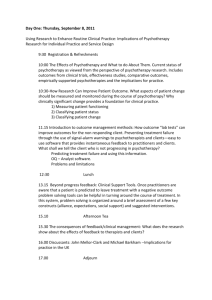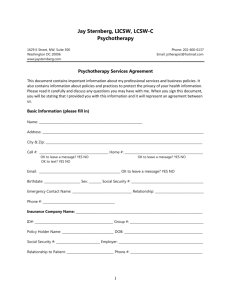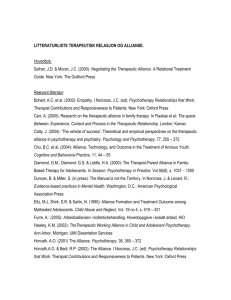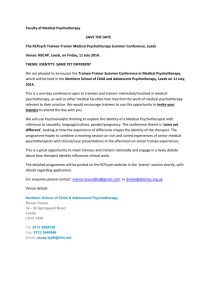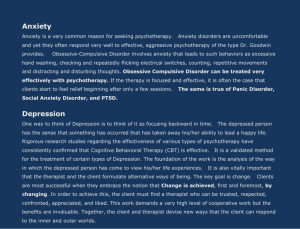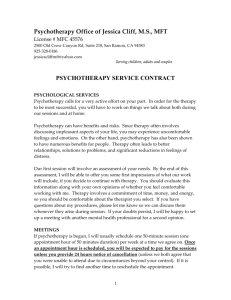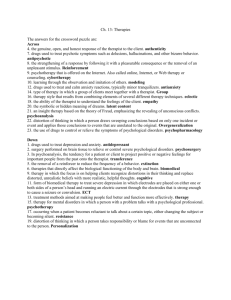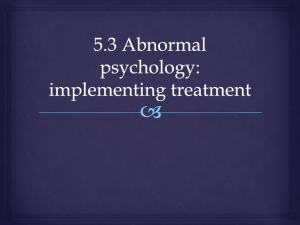10b Bill Robinson Session 10 - FIT short version
advertisement
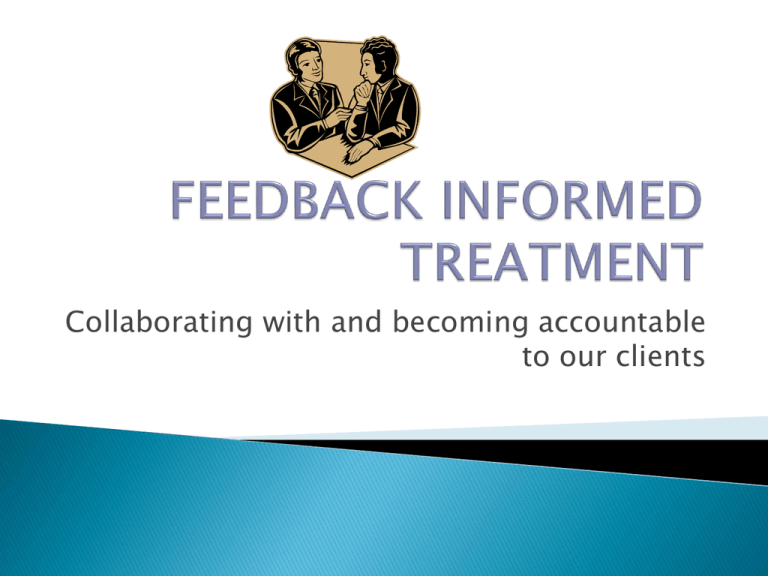
Collaborating with and becoming accountable to our clients Client and extratherapeutic factors. Includes clients resources, external support and ideas about change The Therapy Alliance Wampold 2001- The great psychotherapy debate. In a study involving over 2000 therapists and clients Brown found that therapeutic encounters in which no improvement occurred by the third visit did not on average result in improvement over the entire course of treatment. Clients who worsened by the third visit were twice as likely to drop out as those reporting progress Variables such as diagnosis, severity and type of treatment not as important as knowing if the client believed they were making progress Heart and Soul of Change p389-406 Agreement on Goals Agreement on Tasks Relational Bond Congruent beliefs on how people change (Client’s theory of change) Bordin E S . (1979)The generalizability of the psychoanalytic concept of the working alliance. Psychotherapy: Theory, Research and Practice, 16, 252-260 Gaston L (1990). The concept of the alliance and its role in psychotherapy: Theoretical and empirical considerations. Psychotherapy Counsellors need to monitor constantly the clients experience of : Change and improvement in the areas of their life that brought them to therapy. The strength of their alliance with the therapist. Ankar, Duncan and Sparks- The effect of feedback on outcome in marital therapy. Journal of Consulting and Clinical Psychology 2009 Shimokawa K, Lambert M & Smart D (2010) – Enhancing treatment outcomes of patients at risk of treatment failure: meta-analytic and mega-analytic review of Psychotherapy quality assurance systemJournal of consulting and clinical psychology 78 298-311 We need to have measures which are: Reliable Valid Feasible Important that we are clear with the client why we are asking them to do this If counselling is going to help it should start to help early The client’s assessment of the therapy alliance is shown to be the more directly related to outcome than the therapist’s assessment Discuss each line and the overall score with the client What is making them go up or down. What needs to happen to make them start to improve or continue to improve Leave time at the end of the session to score and discuss the SRS especially if it is on the low side. If no progress shown on the ORS after 3 or 4 sessions it is time to discuss with the client what this means Go over each line in the SRS Brainstorm with the client what would be of more assistance. Different approach, different counsellor or continue as we are for now. After 6 to 8 sessions and no improvement time to look seriously at alternatives Important to be able to fail successfully and make a successful referral based on the client’s feedback Clients who fail to make progress with one counsellor can frequently work successfully with another one. By not letting go we could be standing in the client’s way to recovery. A score above the cutoff generally tells you nothing If the client scores below 36 or below 9 on any line we need to acknowledge this and invite a discussion If the client scores above the cuttoff but clearly lower than in previous sessions we need to explore this with them Establish a culture of feedback Take every opportunity to let clients know that you need and value their feedback. Let your clients help you become a better therapist Relationships Australia Mandurah Tel 95836000 Email bill.robinson@wa.relationships.com.au To download the measures go to www.scottdmiller.com For further support and ongoing discussion go to www.centerforclinicalexcellence.com www.Fit-Outcomes.com www.MyOutcomes.com


![UW2 - Psychiatric Treatments [2014]](http://s3.studylib.net/store/data/006859622_1-db6167287f6c6867e59a56494e37a7e7-300x300.png)
